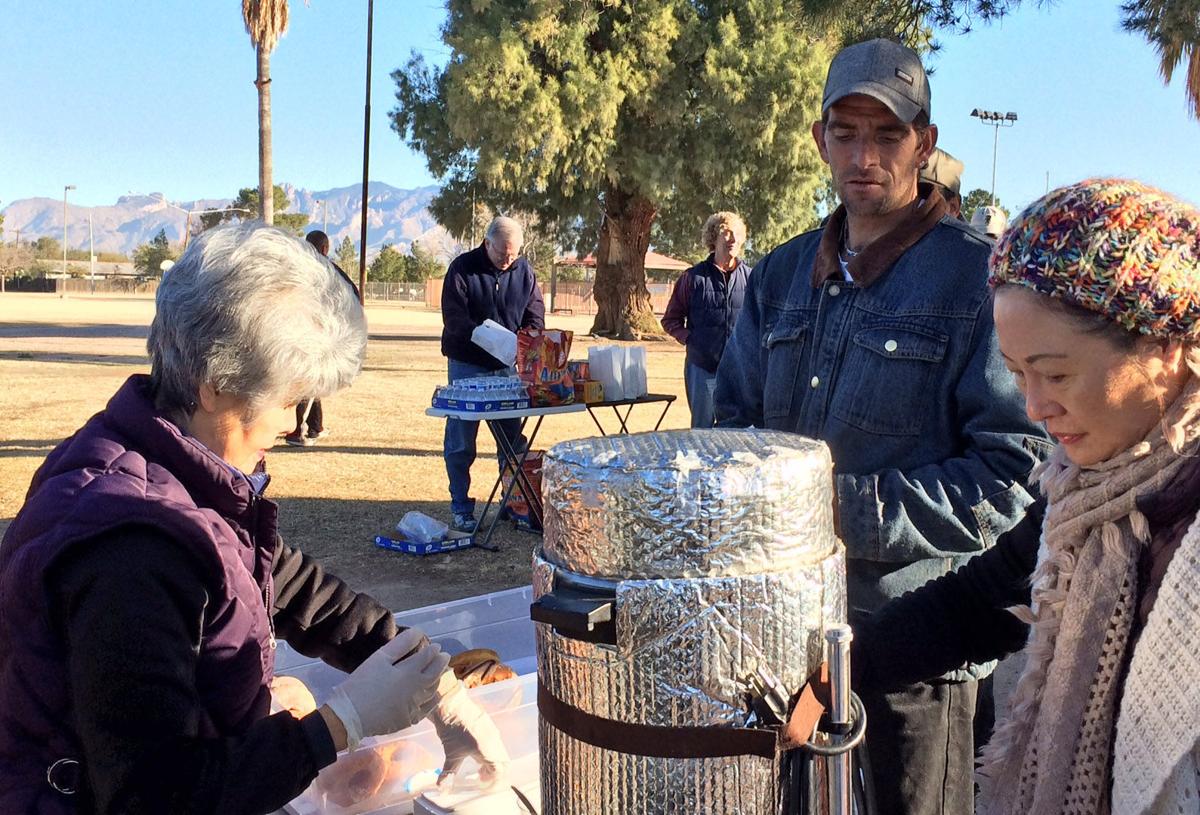The clock passed 9:30 and then reached 10 p.m. Dec. 5 as Tucson City Council members debated a pair of ordinances dealing with homeless people on public property.
Some council members, seemingly spent after a long study session followed by this marathon regular session, were slightly slurring their words, with others breaking into giggles at strange moments.
Recognizing this, Councilwoman Karin Uhlich asked to postpone considering the measures — “I’m not really good at 10 o’clock at night,” she said.
But the council went ahead and passed the changes by a 5-2 vote, Uhlich and Steve Kozachik voting no. One change involved sleeping on sidewalks, and the other, less-noticed one regulated feeding the homeless at city parks. That feeding ordinance has been in effect for 19 days now and is working about as well as you’d expect for something passed late at night by exhausted elected officials.
Some of the people trying to abide by the new rules are getting a bureaucratic run-around. The others have just gone back to their old way of doing things, thinking wishfully that they are following the ordinance.
I observed that Tuesday morning at Santa Rita Park. Ann and Bob Fortenbaugh were handing out baggies of packaged foods, like cheese-and-cracker packs. The man known as “Pastor Amos,” Hyun Joung, and members of his church were handing out doughnuts and coffee, as they did for years before Pima County cracked down last year.
Both thought they were following the new city rules. Neither were. And no one with any sense would bother to object.
The discussion dates back to the bad old days in late 2014 and early 2015 when homeless people began camping in Veinte de Agosto Park downtown in increasing numbers, culminating in the appearance on city sidewalks of “sleeping pods” and tents. Eventually the city put a stop to that, in part by closing the park.
The city remains embroiled in a civil suit over its treatment of homeless people using public spaces like sidewalks, but it is in the meantime trying to assert some other controls. That’s why the council considered and passed the ordinance changes Dec. 5.
The better-known one said people may sleep on the sidewalk as long as they leave 5 feet for pedestrians to pass and have no more than 4 cubic feet of belongings there. The lesser-known one said that if you want to feed 10 or more people in a park, then you must get a permit from the city parks director.
The permit is free and renewable for up to six weeks, at which point you need to get a new one. But if you don’t get one and you’re caught feeding people, you could be fined $100.
That idea was based on a faulty reading of reality, one that came largely from downtown business interests. Some merchants saw people lining up to get coffee and doughnuts from Joung at Jacome Plaza or Veinte de Agosto Park and apparently concluded that’s why homeless people were congregating downtown.
But of course, homeless people have been gathering in downtown-area parks and plazas for decades. People like Pastor Amos, who feel a calling to feed homeless people, would be pretty stupid to take their food to parks and street corners where nobody is congregating. They’re just going where the people are.
And when they do, once in a while something magical happens.
I talked to Leo Vazquez, a 53-year-old Tucson man Tuesday morning, and he told me Pastor Amos helped him change his life.
“It started off with one coffee, one doughnut and one of his prayers,” Vazquez said. “I hear one of his prayers, and that inspired me to kick my drug addictions.”
About six months later, Vazquez has been able to stay off cocaine, meth and marijuana, he said. But the one substance he hasn’t been able to kick is a legal one — tobacco.
Vazquez also spearheaded the effort to get a city permit for The Loving Church, Joung’s congregation. What he got, though, after following city advice, was a business license.
Ann Fortenbaugh told me she called City Hall after the ordinance was passed and was told that since she’s handing out packaged foods, she doesn’t need a permit.
Actually, that’s not true. She doesn’t need a Pima County Health Department permit, but she does need a city permit. And Joung also needs a health department permit because he’s passing out nonpackaged foods. The business license doesn’t solve that problem.
Meanwhile, Michele Ream, a longtime advocate for homeless people, has been trying to get a permit since Jan. 15. Pima County sent her to the city, but no luck so far.
“I don’t care how they phrase it, it’s definitely about deterring homeless people from gathering,” Ream said.
I agree with her and with Kozachik, who noted that the permit requirement never was really necessary: “If someone is causing a public safety or health issue, we have the tools to deal with it.” That’s true now and was true before they sleepily approved this misguided ordinance.





